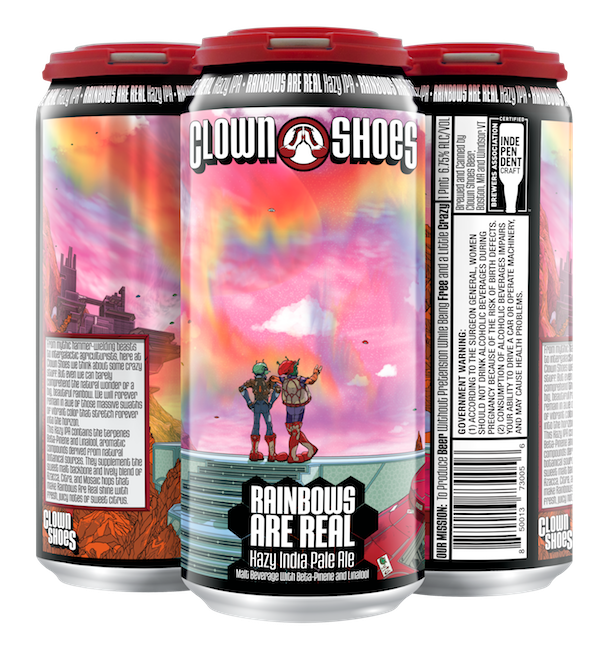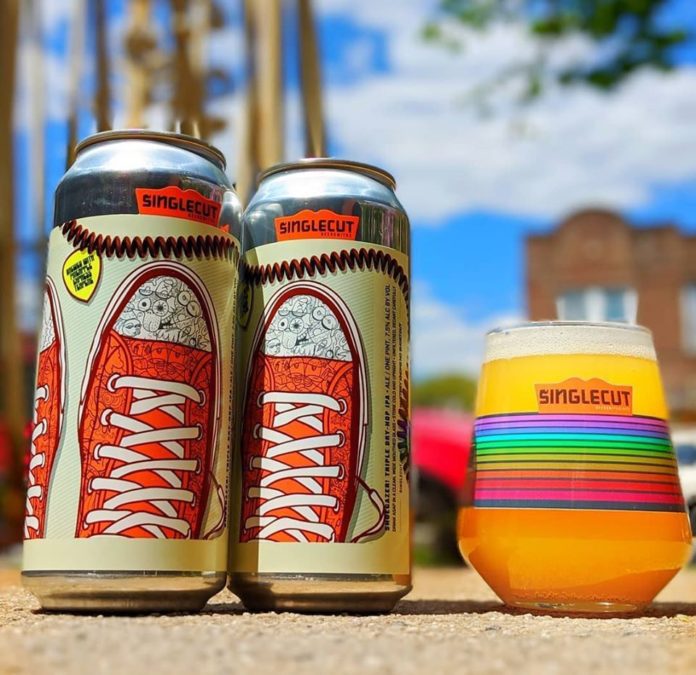As craft beer grapples with the threat of COVID-19, there’s another (smaller) struggle playing out: the search for new flavors.
The innovation spike that accompanied the industry’s recent expansion has left many brewers and consumers wondering what’s next. Discovering different flavors and styles has become increasingly harder.
In this quest for what’s new, some brewers are experimenting with terpenes.
What are these? Terpenes are aromatic oils found in natural botanical sources, including hops and cannabis. (After all, both plants are genetically related.) Obviously terpenes do not get you “high.” However, some research suggests that they may have therapeutic benefits.
Moreover, brewing with terpenes — typically through dry hopping — can enhance flavors and aromas in craft beer. In particular, terpenes can emphasize dank and fruit flavors in a way that’s bright, balanced, fresh and rounded.

Clown Shoes Beer recently released a new hazy IPA, Rainbows are Real, made with Terpenes. The process took about ten months to gain TTB approval, recalls Head Brewer Dan Lipke.
“We were going back and forth to make sure everything was legal,” says Lipke. “We’re trying to get more terpenes pre-approved. There’s hundreds that we could be using.”
Part of the problem is the rocky history of terpenes in beer. Much of this owes to cannabis and hemp terpenes, which have long interested brewers. After all, the Venn diagram for fans of craft beer or cannabis contains a huge overlapping section in the middle.
Craft pioneer Lagunitas Brewing Company is openly pro-pot. As beers containing cannabis terpenes first started appearing in California around 2016 — led by Thorn Street Brewing’s OG HighPA — Lagunitas was eager to participate. In 2017 they launched Supercritical, made with cannabis terpenes extracts.
The innovative beer proved popular, says Brewmaster Jeremy Marshall. Unfortunately, it was also, technically, illegal. Lagunitas at the time was unaware of this detail.
“When we made Supercritical, we thought that because it contained no psychoactive compounds, and we would only serve it on draft, that it would be fine,” says Marshall. “Another brewer told on us. And it turned out they were right.”
Laws in America forbid the use of hemp or cannabis in beer, except for the sticks and seeds. Problem is, only the flower contains terpenes. So hemp and cannabis terpenes remain illegal in beer.
“It’s going to take federal [cannabis] decimalization for all breweries to be able to do this,” says Marshall. “And that always feels like we’re five years away from that.”
Still, the Lagunitas brewmaster reports a slew of smaller producers (especially in California) brewing with cannabis terpenes. (Cannabis terpenes are readily available on the market because of their use in legal recreational and medicinal THC products.)
“Either these brewers don’t know the law, or they’ve decided to take the risk,” says Marshall.
What about the larger players making terpenes beers, like Clown Shoes, Sweetwater, or SingleCut? They either use cannabis seeds, Marshall explains, or terpenes from the many botanical sources other than cannabis.
SingleCut Shoegazer is a 3XDH IPA that includes a dry hop with Pineapple Express terpenes. The Queens-based brewery operates with a musical theme, and wanted to create a beer that mimics a My Bloody Valentine album. “Something with a strong pulse and rhythm,” says General Manager Dan Bronson, “and underneath that, a slurry dankness.”
The terpenes provide the beer with a “beautifully balanced and intensely saturated dankness beneath a super-vibrant, fresh essence of lemon and lime, and that signature pineapple flavor,” Bronson adds.
That is the roll of terpenes in beer. They enhance natural craft beer aromas and flavors in a way that presents differently than drinkers are accustomed to. Terpenes round out and brighten what’s already there.
“The depth of aroma that comes through is an alternative version, a cool new take on something that people are already used to, now made fresh all over again,” Bronson explains.
Another reason that terpenes are just now trending — besides the cannabis/hemp problem — is the technology. Before recent advances, it was more difficult for brewers to effectively buy and utilize these compounds.
“You can now get terpenes as isolates,” says of Lipke of Clown Shoes. “You can now zero in on one flavor compound.”
“Companies are now also selling terpenes blends modeled after cannabis strains,” Lipke adds. This is another way that breweries can take advantage of terpenes — buying non-cannabis botanicals — without running into legal trouble.
Companies that extract and package terpenes now also offer these compounds in a format that’s alcohol-soluble. This makes terpenes significantly easier to use in food production, Bronson explains.
The reaction from consumers has been somewhat mixed.
“Shoegazer either got great scores from people on Untappd, or there were people who didn’t like it at all,” Bronson says. “Some of the market is further away from mainstream cannabis culture.”
“One wholesaler was concerned how Shoegazer would go over at some of their more conservative stores,” he adds. “Thankfully, no problems came from it. And the people who wanted [Shoegazer] were extremely happy they got it.”
SingleCut plans to launch additional beers made with terpenes. Craft culture would seem to benefit, overall, from broader use of these compounds. For brewers, they’re a valuable new item in the toolbox of flavor and creativity. For consumers, they’re a refreshingly different take on older styles.
“Terpenes are very expensive, but very efficient in producing flavor,” says Bronson. “So I could definitely see more breweries embracing them, especially as IPAs and DIPAs remain the staple style.”
Lipke of Clown Shoes imagines a day when craft fans understand terpenes with the intense knowledge they now have with the various hop strains.
“Ideally, with the rising awareness of terpenes and cannabis, we’ll start to see people understanding and loving individual terpenes,” he says. “Craft beer fans always love digging deeper. Terpenes bring more flavors for them to explore.”
Kyle Swartz is editor of Beverage Dynamics magazine. Reach him at kswartz@epgmediallc.com or on Twitter @kswartzz. Read his recent piece How Does Craft Beer Survive COVID-19?





[…] https://beveragedynamics.com/2020/06/22/terpenes-craft-beer/ […]